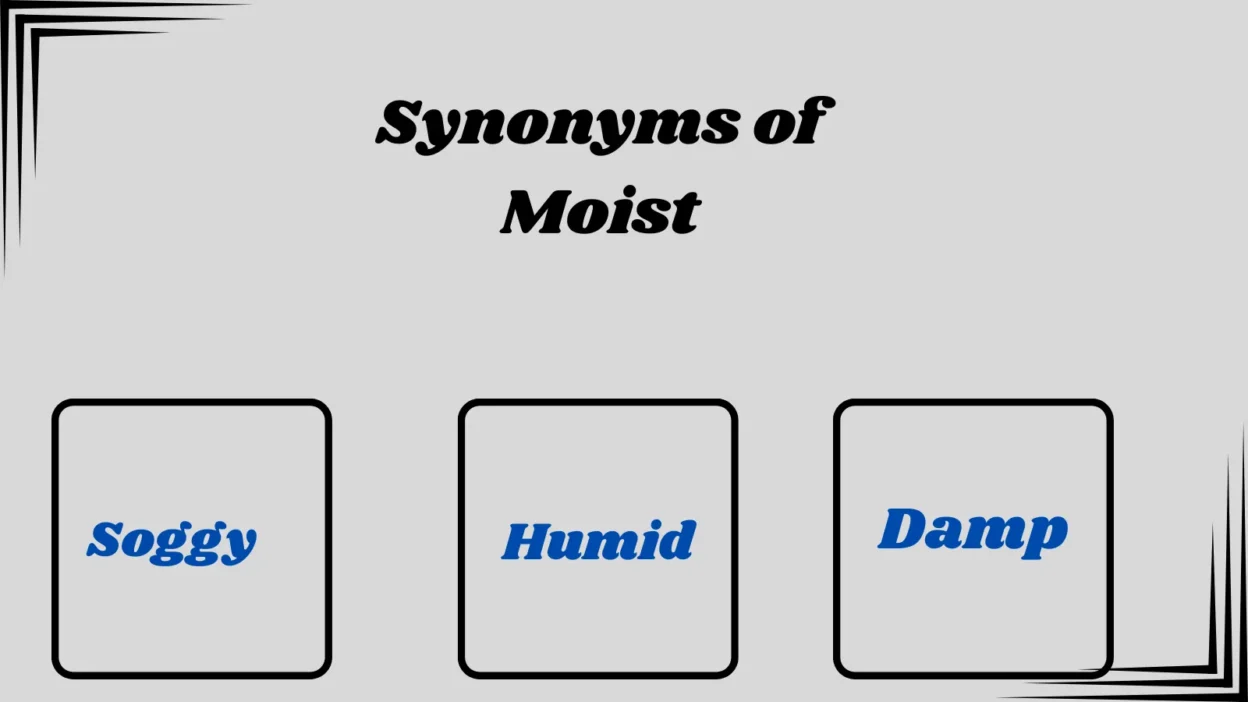Synonyms of Moist can help you capture the perfect degree of dampness—whether you’re describing food, weather, fabric, or skin. When you hear the word moist, what comes to mind? Typically, it refers to something slightly wet—but not drenched or soaked. It’s that perfect touch of wateriness, just enough to be noticeable but not overwhelming. Think of freshly baked bread, dew on grass in the morning, or the soft, pleasant humidity after a light rain.
Writers, chefs, skincare experts, and weather forecasters all rely on the right word to convey just the right kind of moisture. And since moist is a word that some people find awkward or overused, having strong alternatives can make your language more precise and comfortable.
In this article, we’ll explore the meaning of moist in detail, then introduce 30 rich and varied synonyms you can use to express different shades of moisture. We’ll break down when each synonym fits best and how to choose the right word for your tone, context, or cultural setting. Let’s dive in!
What Does Moist Mean?
Moist describes something that is slightly or moderately wet, often implying freshness, softness, or even life. It doesn’t mean soaking wet or dripping, but just enough water to be perceptible. In writing, it can evoke feelings of warmth, naturalness, or even sensuality, depending on the context.
Some key nuances of most include:
- Moderate wetness — not dry, not soaked.
- Freshness — often linked to food, plants, or skin.
- Softness — moisture often softens texture.
- Subtlety — the wetness is noticeable but gentle.
30 Synonyms of Moist — What They Mean and When to Use Them
Here are 30 alternatives for moist with examples and usage tips:
1. Damp
Meaning: Slightly wet, often implying a bit unpleasant or chilly.
Example: The basement felt cold and damp after the storm.
Use: For mild wetness with a hint of discomfort or coolness.
2. Humid
Meaning: Air containing a lot of moisture; oppressively wet or sticky.
Example: The tropical climate was hot and humid all year round.
Use: Mainly for weather and atmosphere.
3. Wet
Meaning: Covered or saturated with water or another liquid.
Example: His clothes were wet after falling in the lake.
Use: General term for soaked or covered in water; stronger than moist.
4. Soggy
Meaning: Unpleasantly wet or soaked, often limp.
Example: The bread was soggy after sitting in the soup.
Use: Food or materials that have lost their firmness due to moisture.
5. Misted
Meaning: Covered with tiny droplets of water, like mist.
Example: The windows were misted up from the cold air inside.
Use: Light moisture, often in atmospheric or natural settings.
6. Dewy
Meaning: Covered with dew; fresh and slightly wet.
Example: The grass was dewy in the early morning light.
Use: Freshness in nature, gentle moisture.
7. Clammy
Meaning: Unpleasantly damp and sticky to the touch.
Example: He had clammy hands before the presentation.
Use: Often describes skin or surfaces with discomfort.
8. Dank
Meaning: Unpleasantly moist or damp, often cold and musty.
Example: The cellar was dark and dank.
Use: Negative connotation, places with stale or moldy moisture.
9. Saturated
Meaning: Completely soaked or filled with moisture.
Example: The sponge was saturated after absorbing all the water.
Use: Extreme wetness, more than moist.
10. Sopping
Meaning: Extremely wet, dripping with liquid.
Example: He came in sopping wet from the rain.
Use: Informal, very wet.
11. Moisturized
Meaning: Made slightly wet or oily to prevent dryness, especially skin.
Example: She applied lotion to keep her skin moisturized.
Use: Skincare context.
12. Juicy
Meaning: Containing a lot of juice or liquid.
Example: The juicy peach was sweet and refreshing.
Use: Fruits or food; implies delicious moisture.
13. Succulent
Meaning: Juicy and tender, full of moisture.
Example: The steak was succulent and flavorful.
Use: Food that’s juicy and appealing.
14. Soaked
Meaning: Thoroughly wet, saturated.
Example: His clothes were soaked after the heavy rain.
Use: More intense than moist.
15. Sogged
Meaning: Made wet and soft, often unpleasantly.
Example: The cereal got soggy from the milk.
Use: Food or materials losing crispness.
16. Misty
Meaning: Covered with fine droplets of water vapor.
Example: The morning was misty and cool.
Use: Atmospheric, subtle wetness.
17. Hydrated
Meaning: Containing enough water or moisture.
Example: Athletes need to stay hydrated for peak performance.
Use: Body or plants, healthy moisture.
18. Waterlogged
Meaning: So full of water that it can’t absorb more.
Example: The field was waterlogged after the flood.
Use: Grounds or objects overwhelmed with water.
19. Soppy
Meaning: Excessively wet or sentimental.
Example: The soppy sponge was hard to wring out.
Use: Informal, mostly negative for wetness; can mean overly emotional.
20. Mushy
Meaning: Soft and wet, often unpleasantly so.
Example: The fruit was mushy and overripe.
Use: Texture in food or objects.
21. Steamy
Meaning: Filled with steam or moisture in the air.
Example: The bathroom was steamy after the hot shower.
Use: Humid environments, often warm.
22. Slick
Meaning: Smooth and slippery due to moisture.
Example: The wet floor was slick and dangerous.
Use: Surfaces wet enough to be slippery.
23. Plump
Meaning: Full and rounded, often because of moisture.
Example: The plump grapes were bursting with juice.
Use: Food or objects swollen with moisture.
24. Glazed
Meaning: Covered with a smooth, shiny layer, often moist.
Example: The doughnuts were glazed with sugar.
Use: Food textures, moist, shiny coatings.
25. Clinging
Meaning: Sticking to something because of moisture.
Example: The damp shirt was clinging to his skin.
Use: When moisture causes adhesion.
26. Lush
Meaning: Richly moist and healthy, often describing vegetation.
Example: The garden was lush and green after the rain.
Use: Positive, natural growth contexts.
27. Sodden
Meaning: Extremely wet, soaked through.
Example: The sodden clothes hung heavy on the line.
Use: Heavy wetness, often negative.
28. Glistening
Meaning: Shining with reflected light, often due to moisture.
Example: Her skin was glistening with sweat after the run.
Use: Positive, shiny moisture.
29. Misted
Meaning: Lightly covered with a fine spray of moisture.
Example: The leaves were misted with water droplets.
Use: Gentle, delicate moisture.
30. Dewy-eyed
Meaning: Literally or figuratively having moist eyes, often emotional.
Example: She was dewy-eyed during the heartfelt speech.
Use: Emotional moisture; tears.
How to Choose the Right Synonym of Moist?
Choosing the perfect synonym depends on:
- Context: Are you describing food, weather, skin, or emotion? For example, use juicy for fruit but humid for weather.
- Intensity: Is the moisture slight (damp, dewy) or heavy (soaked, sodden)?
- Tone: Positive (lush, glistening) or negative (clammy, dank)?
- Cultural connotations: Some words may sound more formal or scientific (hydrated), while others are casual or slang (soppy, sopping).
- Sensory impression: Softness and freshness (moisturized, succulent) vs. unpleasant wetness (mushy, clammy).
Conclusion
Expanding your vocabulary around the word moist lets you paint richer, more precise pictures in writing. If you want to evoke the freshness of a dewy morning, the discomfort of a clammy handshake, or the juicy appeal of a succulent peach, there’s a perfect synonym waiting for you.
Remember to consider context, tone, and cultural nuances when choosing your words. With these 30 alternatives, you’re well-equipped to add moisture — literally and figuratively — to your writing in vivid and engaging ways!



